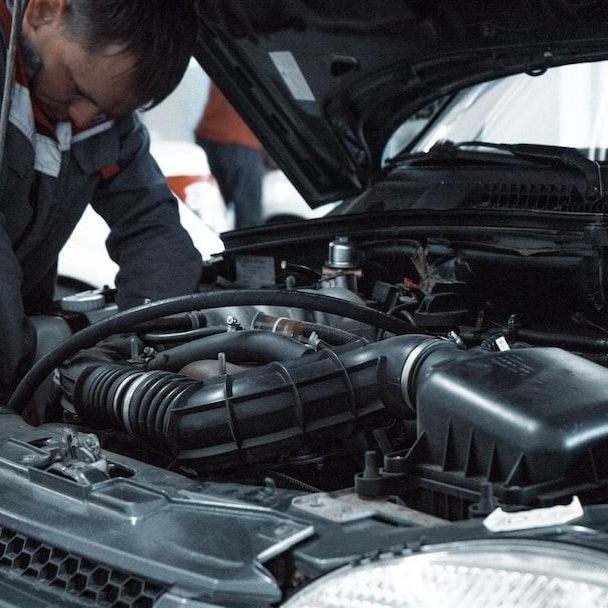PCV Valve
Precision Engine Breathing: The PCV Valve Advantage
Imagine that magnificent internal combustion engine hiding underneath the vehicle hood. It’s a fine piece of machinery, working day and night to power your travel wherever you want to go. But it produces a lot of emissions, too, and you need strong emission control to keep that vehicle on the road responsibly. Enter the PCV valve.
PCV stands for positive crankcase ventilation. Positive crankcase ventilation is the method by which a combustion engine removes unwanted fumes from the crankcase, the part of the engine containing its crankshaft, piston rings, and other necessary components. As the engine burns fuel, crankcase gases get filtered by the PCV system's valve. Without effective gas recirculation and PCV valve operation, your vehicle won’t pass emission standards.
Let’s discuss PCV valve operation and how the expert automobile mechanics at The Wrench Connection
can help you keep yours in great shape.

The Role of the PCV Valve
The PCV valve is a key component for optimal engine health and pollution prevention. Emissions from the running engine, called blow-by gases, pass through the valve on their way to mixing with fresh air from the engine intake. The gases then run through the engine again as part of the combustion process.
This process, however, creates some waste product. Some emissions build up in the form of sludge around the valve. That reduces the efficiency of the system’s emission control, raising your vehicle’s environmental footprint and, ultimately, damaging the engine itself.
Frequency of Repair Needs
The good news here is that the team here at The Wrench Connection can repair or replace PCV valves fairly easily if we catch the problem early enough. It’s often just a matter of cleaning the valve to remove buildup. If we need to replace the valve, we’ll let you know what we see and be transparent about our pricing.
With a smoothly running vehicle, PCV valves are replaceable somewhere between every 20,000 and 50,000 miles. That’s a long interval for most drivers, so it’s easy to forget about. The issue with that, however, is that PCV valves are typically made of fragile rubber or plastic components. It’s possible for these materials to fail unexpectedly, but regular inspections conducted by seasoned automobile mechanics at The Wrench Connection
can keep that from ever happening.
Signs of Trouble With the PCV Valve
PCV valves are easy to replace, but many people wait to do so until the last minute. Understandable as that may be, it isn’t a good idea. All those gases passing through the valve create a waste buildup. It might not break today or tomorrow, but sooner or later it will, and this can create a lot of unnecessary trouble.
That’s why it’s better to take the vehicle into The Wrench Connection and get that PCV valve taken care of early. There are many warning signs to watch out for with your PCV valve. Any one of these could be a good reason to take the vehicle in for an inspection:
- Rough handling while the vehicle is idling or stalled. The cause could be an excess of air entering the engine, which is often caused by the PCV valve.
- The check engine light turning on suddenly. If a faulty PCV valve is to blame, this could mean the vehicle’s oxygen sensors detected something wrong with the engine’s air mixture condition.
- Oil leaking mysteriously from the gasket or seals. Elevated pressure inside the crankcase could be the blame here, with the PCV valve itself as the most likely culprit.
- Strange noises while running the engine. This could be caused by sludge buildup in the engine that, if left uncleaned, could seriously damage or even ruin the engine.
- Excessive fuel consumption. When the PCV valve fails to fully purify emissions, the engine might pump too much fuel into the air-fuel mixture, leading to waste.
- Backfires or slow acceleration. These could be caused by a PCV valve creating an air-fuel mixture that is too lean. Left unprepared, you might not be able to even start the vehicle.
Other worrying symptoms to watch out for include gasket failures, excessive engine oil consumption, and high-pitched noises when running the engine. Any of these could signify a growing problem with the PCV valve, so be sure to take the vehicle to The Wrench Connection for a full checkup if you notice them.
But remember that PCV valves won’t always tell you when there’s a problem. They’re made to run with degraded performance for a while without failing entirely. Unfortunately, some people drive for a long time with poor engine efficiency or valve operation that could be fixed with a relatively simple repair.
Contact The Wrench Connection for PCV Valve Maintenance and Repair
The Wrench Connectionhas been in this business since 1994. We proudly offer high-quality automotive maintenance and repair services to the people of Orlando, FL. Our expert team of service professionals uses the latest equipment to test, service, and repair your engine’s PCV valve and help you avoid a serious problem down the road.
Simply contact us at (407) 438-5153 to schedule a service appointment at 7200 S Orange Ave Ste 107, Orlando, FL 32809. We offer transparent, fair pricing by licensed automotive service professionals.


